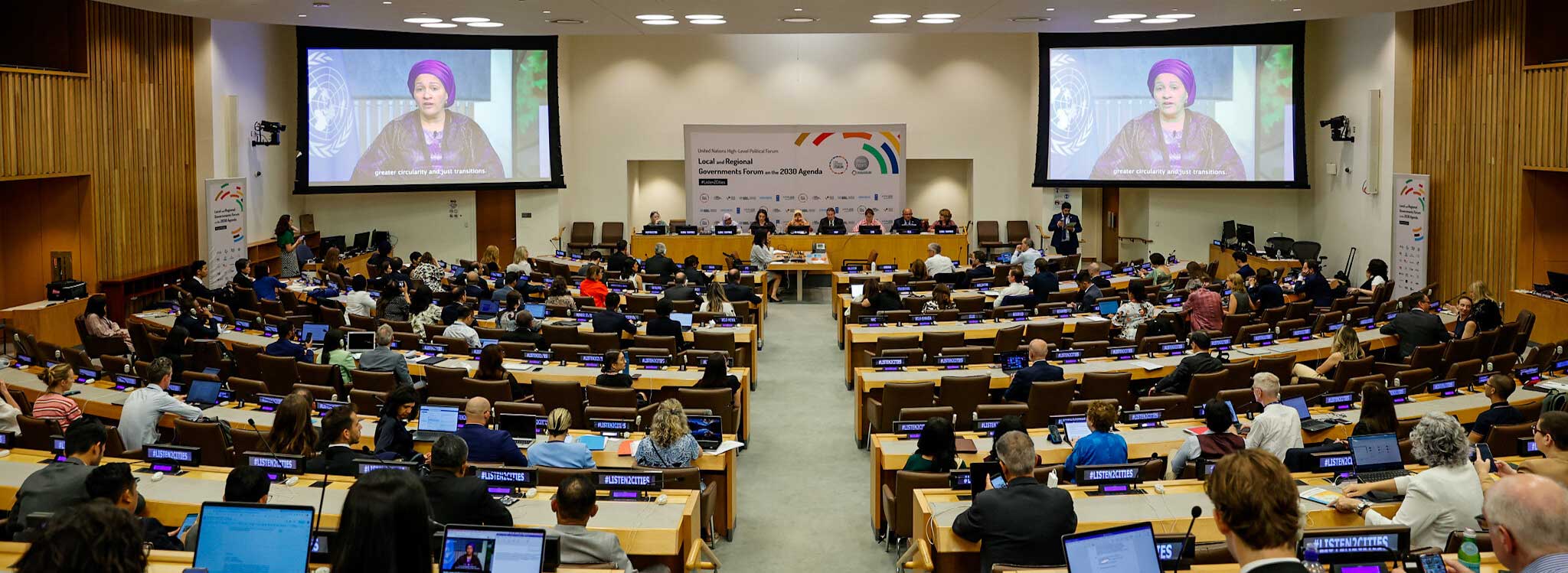LOCAL
MULTILATERALISM
IN 2024
Where to focus the efforts?

Rethinking multilateralism and global governance are essential for most actors leading the key institutions of the post-Second World War system heritage. The United Nations Secretary-General, António Guterres, has been one of the most active voices urging on accelerating change and engaging member states, experts and stakeholders in offering proposals to adapt systems to the current global reality.
July 2024 will mark 80 years since the Bretton Woods Conference and the establishment of the World Bank and the International Monetary Fund. To suggest that systems created in a geopolitical context unrelated to the present are outdated is an understatement.
Over the past decade, local and regional governments have gained unprecedented space for open dialogue and contributions to the United Nations. However, translating these spaces into formal agreements remains a significant challenge, particularly amidst increasing nationalism and conservative approaches.
With only six years until 2030, localisation is more important than ever. There are countless solutions to unaffordable housing, rising living costs, the effects of climate change, the lack of basic services, and ongoing conflicts.
By localising the SDGs and making them tangible, it is possible to empower local stakeholders and encourage citizen participation. Through tools like participatory budgeting, sustainable development can become more responsive to local needs, positively impacting small communities and sprawling megacities.
The UN Summit of the Future, proposed in the “Our Common Agenda” Report from the UN Secretary-General, aims to establish a new global consensus for a shared future and the actions needed to secure it. The Summit will be held in September 2024 and is viewed as a unique opportunity to rebuild trust and strengthen international cooperation. The main outcome of the Summit of the Future will be an action-oriented, negotiated outcome document entitled the “Pact for the Future,” which envisions the future of the multilateral system for the next 25 years and is set to be adopted in the lead-up to and during the Summit in September 2024.
The zero draft of the Pact for the Future was published on 26 January 2024 by the co-facilitators of the intergovernmental preparatory process of the Summit, the Permanent Representatives of Germany and Namibia.
As part of the inputs received, it includes the written contributions of the Local Authorities Major Group, gathered within the Global Taskforce of Local and Regional Governments, facilitated by UCLG.
A consultation process with stakeholders was proposed with the publication of Draft Zero “to complement intergovernmental consultations and ensure diverse voices and perspectives can contribute.”
A virtual consultation with major groups, other stakeholders, and civil society representatives will occur on 21 February 2024. The deadline for feedback on the zero draft of the Pact for the Future is 12 February 2024. A United Nations Civil Society Conference will take place in Nairobi (Kenya) from 9 to 11 May 2024, and its deliberations and outcome will be a valuable contribution towards the outcome of the Summit of the Future.
As of the initial version of the zero draft, a commitment to facilitating a more structured and inclusive engagement of local governments in ECOSOC and its functional and regional commission is included.
The constituency of local and regional governments is mainly engaged in the process through the “Advisory Group on Local and Regional Governments,” a group made up of twenty members, fifteen of whom are representatives of local and regional governments, to enhance collaboration between the United Nations and local and regional governments focusing on strengthening their engagement in UN intergovernmental processes. The chairs are the President of the Nouakchott Region (Mauritania) and the State Secretary for International Cooperation of Spain.

© UCLG
During the Advisory Group launch in October 2023, Guterres, the UN Secretary-General, reaffirmed the United Nations’ determination “to make the multilateral system have a strong connection to local and subnational authorities, independently of the intergovernmental nature of the system.” He also recognised that “there is certain resistance from many Governments to have multi-stakeholder approaches, including local authorities [and] civil societies.”
Before the Summit for the Future, the 2024 High-Level Political Forum (HLPF) will be held in July under the theme “Reinforcing the 2030 Agenda and Eradicating Poverty in Times of Multiple Crises: The Effective Delivery of Sustainable, Resilient and Innovative Solutions,” reviewing five of the Sustainable Development Goals: SDG 1 (No Poverty), SDG 2 (Zero Hunger), SDG 13 (Climate Action), SDG 16 (Peace, Justice and Strong Institutions) and SDG 17 (Partnerships for the Goals).
In parallel with the Pact for the Future negotiations, several key steps are taking place towards 2025, such as preparing the Fourth International Conference on Financing for Development and the World Social Summit.
“Local leaders are vital for global solutions. You are an essential link in the chain of ownership and trust between multilateral institutions and the people we all serve.”
“I would say the role of local power can even be more important than national power for the political life of a country, in multiple ways.”
António Guterres, UN Secretary-General
 This publication was produced with the financial support of the European Union. Its contents are the sole responsibility of UCLG and do not necessarily reflect the views of the European Union.
This publication was produced with the financial support of the European Union. Its contents are the sole responsibility of UCLG and do not necessarily reflect the views of the European Union.